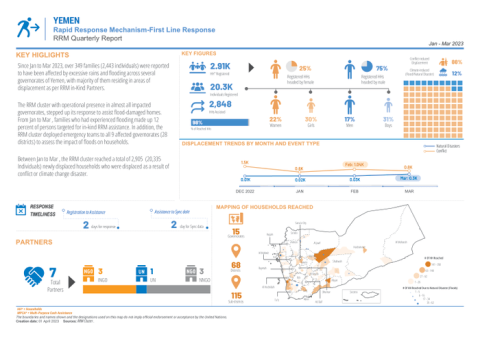Yemen: Investing in Human Capital to Protect the Future


IMPROVING HEALTH, NUTRITION, AND PUBLIC HEALTH SERVICES IN 2000 HEALTH FACILITIES
Yemen's public health system has been devastated by conflict for more than seven years. As a result, only 51 percent of health facilities are still functioning. Yemen Humanitarian Overview 2022 estimates that as of today 21.9 million people, more than half of them children, need support to access critical health services. Additionally, more than eight million Yemenis need lifesaving nutrition assistance.
Providing life-saving assistance to Yemenis
The Emergency Human Capital Project (EHCP) is supported by the World Bank’s International Development Association and implemented by UNICEF, WHO, and UNOPS. The project provides essential health, nutrition, water, and sanitation services to Yemen's population in response to deteriorating health and nutrition conditions.
As part of a multisectoral response, the project offers Yemeni people essential maternal, newborn, and child health services in health facilities. It also uses outreach services, such as mobile teams, as well as community-based service providers, to help detect and treat acute malnutrition in children under five. Furthermore, it supports local water and sanitation authorities to respond to emergency situations as well as strengthen their systems.
The EHCP is the successor to the Yemen Emergency Health and Nutrition Project (EHNP), and it aims to protect Yemen's human capital. Through the provision of essential services, it intends to support public health and population-based interventions, restore water supply and sanitation services, including responding to emergencies and disease outbreaks, as well as build national and local capacities/institutions for health and Water, Sanitation, and Hygiene (WASH) service delivery and management. With grants of $300 million from the International Development Association (IDA), UNICEF, WHO, and UNOPS, the new project continues to support primary health care facilities and hospitals.
Preventing health system collapse and strengthening workforce capacity
Initially, the World Bank intervention aimed to prevent the collapse of the health, nutrition, water, and sanitation systems due to conflict and economic crises. During the course of the project, however, the objectives evolved into a system-strengthening approach. This has meant expanding beyond the provision of inputs, to support aimed at preserving health services, as well as investing in health systems, such as human resources and health information systems. Similarly, WASH emergency interventions in the first two years of the project have focused on improving access to safe water and sanitation services to prevent the transmission of Cholera/ Acute Watery Diarrhea in households, communities, schools, and health facilities. While it is important to ensure that hygiene and sanitation conditions are in place in the immediate term, the focus has shifted to strengthening the water supply and sanitation systems and strengthening resilience.
In all 23 governorates of Yemen, EHCP targets over 2000 health facilities with payments of operational costs, per diems for health workers engaged in outreach and rapid response for communicable diseases, medical supplies including personal protective equipment (PPE) to ensure continuity of essential services during the COVID-19 pandemic, and training for health workers.
Improving access to clean water, sanitation, and hygiene services
In 2018, as part of the WASH activities and in response to a cholera outbreak, EHNP set up the Cholera Response Program, which aimed at scaling up the delivery of an integrated package of health, water and sanitation services.
Since early-2022, additional emergency WASH interventions have included the provision of fuel support for 33 local water and sanitation companies in 14 governorates, water trucking for internally displaced persons and host communities in 13 governorates, and minor rehabilitation of water networks, the provision of emergency latrines, and solarization of water wells.
This resulted in the provision of improved water sources to 3.36 million people and improved sanitation conditions for nearly 3.24 million people as of June 2022.
EHCP supports 46% of Yemeni primary health care
Through EHCP interventions, more than 2,000 health facilities are supported in Yemen's 23 governorates. The interventions support the Minimum Service Package (MSP), improve access to essential preventive and curative nutrition services, and support administration, monitoring, and evaluation (M&E) of the EHCP.
Preventive and curative nutrition services accessible
By addressing acute and chronic malnutrition, the project supported the provision of a package of essential nutrition services to vulnerable children and their families. Mobile teams and an extensive network of community health volunteers provided maternal and child nutrition services at PHC facilities and community levels.

Sana’a – The occupied Yemeni capital Sana’a is witnessing mounting economic panic and a sharp collapse in the real estate market…

Aden – The vessel Kota Nanhai departed Al-Mualla Container Terminal at Aden Port this evening after completing the unloading of 457 standard…

Aden — Yemen’s Presidential Leadership Council Chairman Rashad al-Alimi held talks with Central Bank Governor Ahmed Ghalib to review th…